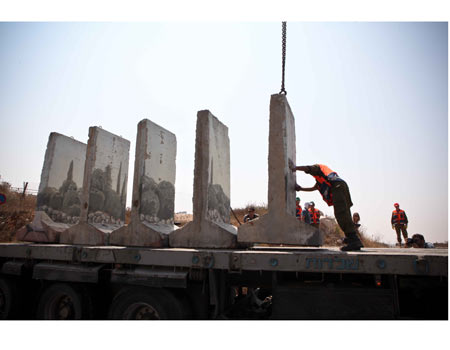Today, the Gilo Wall is being taken down (
link,
link.) What is this wall and when was it built?

Well, in the scary days of the second intifada (2000-2001), there was daily shooting from Beit Jala (on the outskirts of Bethelehem) towards the Jerusalem neighbourhood of Gilo. Snipers fired into apartments of regular citizen, and made life unbearable for the people living in the southern edge of the city. And so, to give some level of protection at street level, Tzahal put up some ugly concrete blocks to give at least some degree of protection. That was a period in which I travelled the roads to Gush Etzion daily wearing a bullet-proof vest. It was a time when you felt that driving along the "tunnel road" from Jerusalem to Gush Etzion had a certain dimension of gambling with your life.
Of course, artists came along to paint on the wall, each with their own idea of the relief that their art might provide for the people of Gilo (see this
video)
And now, a return to normalcy has been declared. The army feel that the wall is unecessary, the immediacy of the threat is absent, and the wall can be dismantled.
So what can we say about this situation?
1. That whereas there is a intense pressure for political settlements and Peace agreements, sometimes, away from the politics, the facts on the ground demonstrate a very concrete sense of improvement, calm and co-existence. (More about this in my upcoming post)
This should make us wonder as to how much can be done on the national level, and how much can be achieved at the grass-roots level.
2. Second, it is interesting to hear the statements by residents of Gilo as to their fear of exposure now that wall has been dismantled. We set up barriers and protections when we are in crisis, and then when life returns to normal, we feel exposed and unprotected without them. We forget about the ugliness of the wall, the price we pay for the loss of the beautiful scenery, the artificial scar upon the landscape.
I think this is true in many areas of life (including politics, religion.) We build mechanisms that respond to a problem. But we forget that when the problem is less acute, that we can dispose of those protections. Sometimes they give us a sense of security. At times, it is simply a fear of exposure that prevents a respone to normalcy. I am glad that the Jerusalem Municipality and Tzahal had the courage to engage in this positive change.
Shavua Tov!





